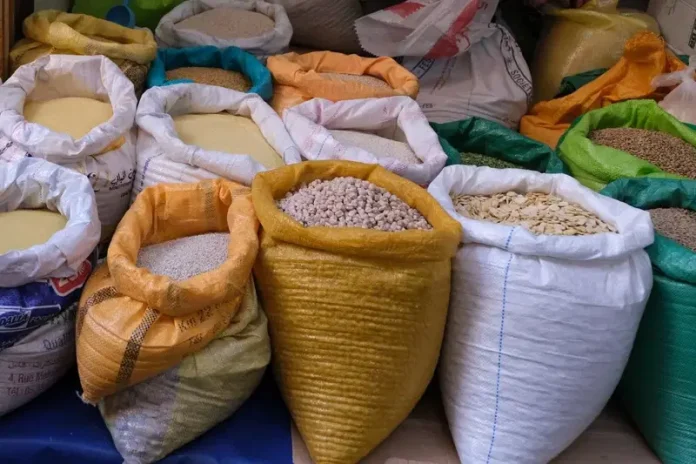Abdulraheem muhammed olarewaju
In an attempt to solve food insecurity and stabilize food prices, the federal government has proposed a new project to restock the National Strategic Food Reserve System.
Aliyu Abdullahi, the Minister of State for Agriculture and Food Security, made this announcement during the International Food Policy Research Institute and Global Alliance for Improved Nutrition’s 2024 Global Food Policy Report unveiling event, “Improving Food Systems for Healthy Diets and Nutrition in Nigeria: Policies and Action.”
Speaking on Thursday at the Abuja event, Abdullahi underlined the government’s dedication to boosting food output, especially for staple crops such as rice, maize, and cassava. “The idea of the National Strategic Food Reserve is for us to be able to keep stock so that we release from it to stabilize the price,” he said. “Prices of food are getting high, and this helps us to release from the stock.”
However, many Nigerians, skeptical of the government’s intentions and promises, have reacted with mixed emotions to this announcement.
A Facebook user, Aisha Baggio, expressed her frustration with the government’s track record, stating, “This government is good at speaking English without action. One year in office, they can’t account for one good achievement in human capital development.”
Similarly, Itz George demanded tangible results: “Please, we want to see their talk in action. Nigerians need results.”
Jplux Douglas called for the return of fuel subsidies, “Bring back the subsidy period.”
Travolta Ibekwe criticized the government’s approach, saying, “These guys think it’s a joke. All this won’t stop the protest. Meet our demands: bring the fuel back to ₦65, open borders, and create jobs for the youths, not all these stories.”
Ozonuwe C. Ambrose dismissed the announcement as another superficial measure, calling it a “palliative government.”
Chizzy Godswill suggested the timing of the announcement was a reaction to planned protests, “See them, because they have heard that protests will hold.”
Meanwhile, MASQO from Garko, Kano State, recognized the strategy but emphasized the urgency: “A good strategy while we need action because Nigerians are in an emergency stage.”
Alfred Asher Lamba was skeptical, “All this one na grammar, and it can’t solve our problems. Just do the needful, and things will shape themselves. Reduce the pump price of petrol, gas, and diesel, and see how things will come down bit by bit.”
Kareem Adams highlighted the need for practical actions, “Reality is what Nigerians need, not empty promises. ‘Do something before something do us.’”
Éhnûbè Ékurà sharply criticized the government, calling it “the most crippled government.”
Collins Kem Owens lamented the government’s corruption, “All of them reason like they are from the same parents. I wonder where they are going to with all this money they are dragging, who will pack pass.”
Faparusi Bunmi Stella questioned the timing, “Why didn’t those people take action before? Why this time around after hearing that protests will hold?”
Samuel Davies humorously labeled the government officials as “comedians on the seat of power.”
Ben Amaigbe raised concerns about the safety of farmers, “Where is the food to restock? Farmlands are now abodes to bandits and Fulani herders. Farmers have since relocated to schools and church buildings. APC has failed Nigeria, it’s not news again. The concern is, where do we go from here?”
Igeweh George-Gabriel criticized the lack of effective policies, “Useless and visionless ideas all the time. How has this helped when all you have done before now was not felt by the poorest of Nigerians?”
Uche Odigbo made a sarcastic remark, “As a member of NDMH (Nigerian Department of Mental Health), we apologize to the public that the person who posted this is one of our patients who escaped here. We assure you that we will do whatever it takes to get him back.”
However, Umar Farouk Benjamin asserted the determination to protest, “We must do our protest; nothing can stop it. Politicians, enough is enough. Many days for a thief, one day for the owner. They have killed our brothers and sisters in this country. We no gree again. We must collect our country back.”
Ehoda John questioned the removal of subsidies without a plan, “What does it take to bring down fuel price and food price? Only one second you removed subsidy without planning for it.”
Olawale Abiodun Oyero suggested opening borders for food imports, “Open border for food only.”




